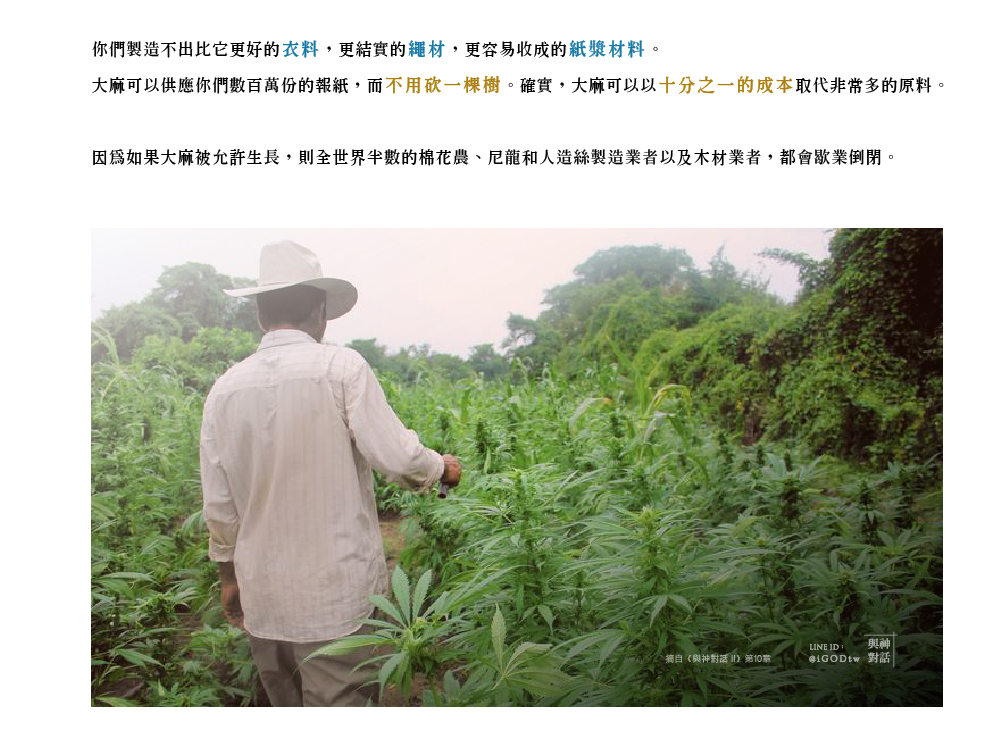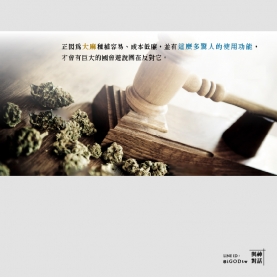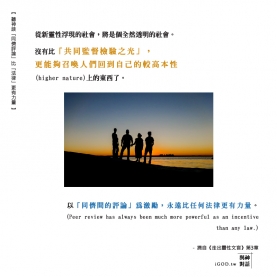思考一下「如果種植大麻是非法,為何種植菸草是合法?」。這問題沒有標準答案。但對於這問題的「看法是什麼、答案是什麼」,是個能觀察出一個社會、一個人的「文明演化程度」的反映之一。
法律是個用來幫助社會大眾得以公平公正互動合作的工具,但也長期淪為權勢者在掌控各個社會的工具。以下是與神對話信息提供的觀察和提醒,希望啟發我們去思考和做出「更高版本的我是誰」的選擇。歡迎參閱:

聽神談【為何種植「大麻」在許多國家是非法的原因】
尼爾:沒有法律的社會是個原始的社會,在那樣的社會中「強權即王道」...。如果沒有我們互相同意的行為法規,我們如何共存?
我並不是建議你們的世界不要有行為的法規和協議(no codes of hehavior, no agreements)。我建議的是,你們的法規和協議應建立在一個更高理解和一種更恢宏定義的自我利益(a higher understanding and a grander definition of self-interest)上。
你們大部分法令所說的,實際乃是最有權勢的人為他們的既得利益所主張的。
就讓我們來看一個例子。抽菸。
目前,你們的法令說你們不可以種植和使用一種叫做大麻(hemp)的植物,因為,政府告訴你們說,那對你們不好。
然而,同樣這個政府卻告訴你們說,種植和使用另一種叫做菸草(tobacco)的植物是好的,而這,並不是因為它對你們有益(實際上政府自己也說它是有害的),卻可想而知,因為你們一向都這樣(以有權勢者的利益為主要考量)做。
第一種植物不合法而第二種植物合法的真正原因,跟健康無關。卻跟經濟有關。也就是說,跟權勢有關。
因此,你們的法律並沒有反映出「你們的社會認為社會該是什麼,並希望成為什麼」——你們的法律反映出的是:權勢在掌控社會。
尼爾:不公平。你選了一個矛盾很明顯的例子。但大部分的情況並非如此。
正好相反。大部分情況都是如此。
尼爾:那麼,解決的辦法是什麼?
法律——那實際上是限制——越少越好。(To have as few laws---which are really limits---as possible.)
第一種野草(weed 大麻)之所以不合法,只是表面上為了健康的理由。實情則是,第一種野草並不比菸草和酒精更有害健康,而後面兩者卻受到法律的保障。為什麼大麻不被允許呢?因為如果讓它生長,則全世界半數的棉花農、尼龍和人造絲製造業者以及木材業者,都會歇業倒閉。(Because if it were grown, half the cotton growers, nylon and rayon manufacturers, and timber products people in the world would go out of business.)
大麻正是是你們星球上最有用、最強、最壯、最耐用的材料之一。你們製造不出比它更好的衣料,更結實的繩材,更容易收成的紙漿材料。你們每年砍幾百萬棵樹來做紙漿,好讓你們在報紙上讀到全球的森林是如何被摧折。大麻可以供應你們數百萬份的報紙,而不用砍一棵樹。確實,大麻可以以十分之一的成本取代非常多的原料(Indeed, it could substitute for so many resource materials, at one-tenth cost.)。

這才是關鍵。如果這神奇的植物被允許種植——順便提到,大麻也有非凡的藥物性能——則有些人會喪失金錢利益。而這就是為何大麻在你們國家是非法的原因!
摘自《與神對話 II》第10章



Neale: Still, truly lawless societies are primitive societies, where "might is right." Laws are man's attempt to level the playing field; to ensure that what is truly right will prevail, weakness or strength notwithstanding. Without codes of behavior upon which we mutually agree, how could we coexist?
I am not suggesting a world with no codes of behavior, no agreements. I am suggesting that your agreements and codes be based on a higher understanding and a grander definition of self-interest.
What most laws actually do say is what the most powerful among you have as their vested interest.
Let's just look at one example. Smoking.
Now the law says you cannot grow and use a certain kind of plant, hemp, because, so government tells you, it is not good for you.
Yet the same government says it is all right to grow and use another kind of plant, tobacco, not because it is good for you (indeed, the government itself says it is bad), but, presumably, because you've always done so.
The real reason that the first plant is outlawed and the second is not has nothing to do with health. It has to do with economics. And that is to say, power.
Your laws, therefore, do not reflect what your society thinks of itself, and wishes to be—your laws reflect where the power is.
Neale: No fair. You picked a situation where the contradictions are apparent. Most situations are not like that.
On the contrary. Most are.
Neale: Then what is the solution?
To have as few laws—which are really limits—as possible.
The reason the first weed is outlawed is only ostensibly about health. The truth is, the first weed is no more addictive and no more a health risk than cigarettes or alcohol, both of which are protected by the law. Why is it then not allowed? Because if it were grown, half the cotton growers, nylon and rayon manufacturers, and timber products people in the world would go out of business.
Hemp happens to be one of the most useful, strongest, toughest, longest-lasting materials on your planet. You cannot produce a better fiber for clothes, a stronger substance for ropes, an easier-to-grow-and-harvest source for pulp. You cut down hundreds of thousands of trees per year to give yourself Sunday papers, so that you can read about the decimation of the world's forests. Hemp could provide you with millions of Sunday papers without cutting down one tree. Indeed, it could substitute for so many resource materials, at one-tenth the cost.
And that is the catch. Somebody loses money if this miraculous plant—which also has extraordinary medicinal properties, incidentally—is allowed to be grown. And that is why marijuana is illegal in your country.










